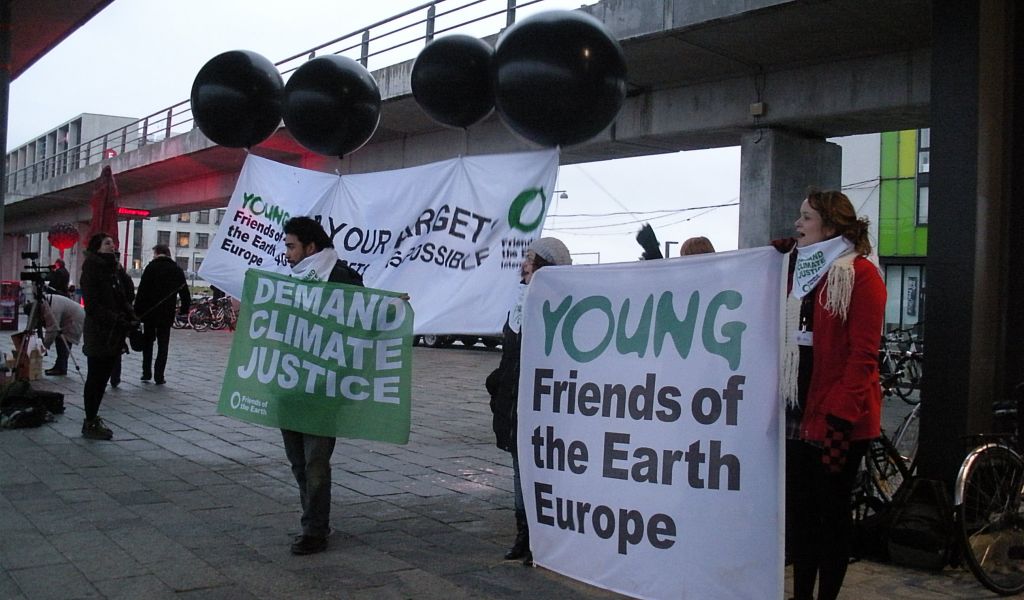"How Old Will You Be in 2050?"


One of the first things you notice here at the Bella Center is the large number of young people that have made their way to the negotiations from various parts of the world. They can be seen (and heard) throughout the building strategizing, reporting back on the atmosphere of the negotiations and their activities, donning animal masks or martian costumes and making up a decent chunk of attendees at the many side events. The distant (and sometimes not-so-distant) sound of chanting from demonstrations in and around the building is a consistent feature of the overall background hum, adding to the atmosphere of energy and enthusiasm that young people seem to have the ability to create.
REDD-net is looking into how this engagement of the next generation of decision makers, agents of change and those who will continue to be affected by the impacts of climate change, might be replicated in REDD program development and implementation in the Asia-Pacific region.
The central question for youth - "Can we trust in this process to give us the outcomes we need?"
Much of the discussion of youth and climate change has focused on education about forests and forestry, getting young people directly involved in forest managemen, working with communities and understanding and appreciating their natural environment. While this is important and could have significant implications for the future, there is also the question of what youth can bring to the negotiations themselves.
Youth NGOs or YOUNGOs have recently been added to the UNFCCC’s list of recognized observer organization. Every morning at 8:30, the YOUNGO contingent meets to de-brief and discuss their strategy for the coming day. As with other observer groups, this strategy has included taking a position on REDD and working with national delegations to ensure that key points are reflected in their interventions.
YOUNGOs have “grave fears over the current REDD deal” and are worried because the LCA and SBSTA REDD text does not:
- Secure the rights and interests of indigenous peoples and forest dependent communities.
- Specifically state that REDD will prioritize protecting intact natural forests and restoring degraded forests.
- Rule out incentivizing the conversion of natural to forest plantations.
- Rule out providing funds, incentives or rights to carbon credits to logging companies who practice so-called sustainable forest management.
- Exclude REDD forest credits from the carbon market and include serious commitments from developed countries to provide funds of a similar scale to the recent financial recovery efforts during the global financial crisis.
Hmmmm, not much new in their position, but are these YOUNGOs bringing anything new to the debate? In fact they are. As one Young Friends of the Earth Europe (http://www.foeeurope.org/youngfoee/index.htm) campaigner described: “This allows us to be more creative in our approach, and not just follow everything the adults do.” I don’t know about you, but a bunch of stodgy, boring old “adults” is certainly not what comes to mind when I think of FoE. So there you have it, perspective and the likely multiplier effect of engaging more youth in environmental issues as a result of outreach tactics that young people can relate to. Young FoE is one example of the growing trend toward increased youth involvement in environmental advocacy. It has grown from country chapters in a few countries to a region-wide network, with national counterparts elsewhere in the world, such as Indonesia.The Indian Youth Climate Network (http://www.iycn.in/) is another national network of youth organizations in the Asia-Pacific region that has sent representatives to participate inthe COP15 negotiations.
The central question put to Yvo de Boer by YOUNGOs in an intergenerational inquiry on climate change solutions – "Can we trust in this process to give us the outcomes we need?"
In response, rather cryptically, Mr. de Boer cautioned his audience to “be careful about that,” letting on that he himself did not have complete trust in the process and leaving many young people unclear as to just what this means for them.
Are these youth making a difference?
In the words of one young panelist: “Many youth underestimate how much of an impact they can have.” This can be achieved through building good relations with government prior to the event, providing policy suggestions and meeting during the negotiations to voice their concerns. A unique role that the growing numbers of multi-lingual young people can and have played is to clarify important miscommunications between delegations resulting from language gaps.
The YOUNGOs may well be the next generation of decision makers or agents of positive change. Through their active and unprecedented participation in the UNFCCC process they are getting a head start at understanding what’s involved in advocacy and how a negotiation process works.
Over the coming days, I intend to learn more about how YOUNGOs have got to where they are in this process and some of the key motivating factors that have let them to get involved. Stay tuned.
posted by Allison Bleaney

